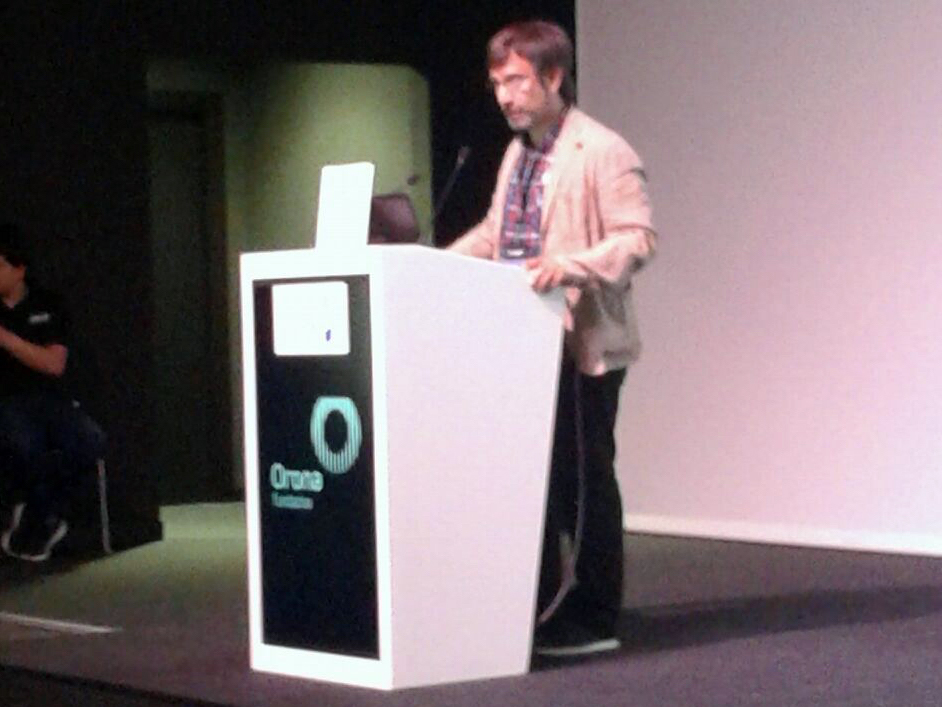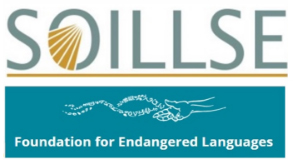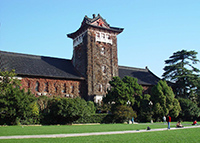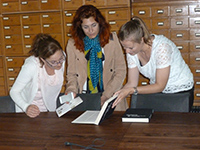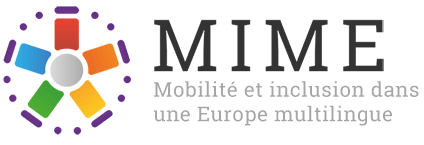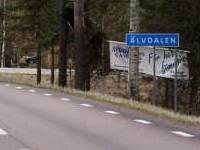Mercator Network Newsletter 123
 |
||||||||||||||||||||||||||||
Number 123 - June 2016 |
||||||||||||||||||||||||||||
| The Mercator newsletter informs you about the news of the five Mercator Network partners: | ||||||||||||||||||||||||||||
| Mercator Research Centre of the Fryske Akademy | ||||||||||||||||||||||||||||
| Mercator Media | Mercator Legislation / CUSC-UB | |||||||||||||||||||||||||||
| Stockholm University | Research Institute for Linguistics | |||||||||||||||||||||||||||
| Newsletter focusing on multilingual regions dealing with regional or minority languages, but also immigrant languages and smaller state languages, with emphasis on language needs arising from migration and globalization. Submit your subscription request, comments or suggestions to: Johanneke Buning (Fryske Akademy). | ||||||||||||||||||||||||||||
| LearnME White Paper presented at the Hitzargiak Gathering, 23-24 June | ||||||||||||||||||||||||||||
| Report about the SOILLSE Conference, 6-8 June 2016 | ||||||||||||||||||||||||||||
| Frisian lexicographer speaks in Shanghai:lexicography as an emancipatory tool for lesser used languages? | ||||||||||||||||||||||||||||
| Delegation from Malta visits Fryslân | ||||||||||||||||||||||||||||
| Brexit: Northern Ireland and Scotland vote "Stay", while Wales votes "Leave" | ||||||||||||||||||||||||||||
| LangOER launches "mini-website" about their final conference in September | ||||||||||||||||||||||||||||
| Mercator at the MIME Stakeholder Forum meeting | ||||||||||||||||||||||||||||
| Sweden's lost forest language gets an ISO code | ||||||||||||||||||||||||||||
|
|
||||||||||||||||||||||||||||
June 23 and 24: Hitzargiak Gathering, LearnME White Paper presented
On June 23 and 24 the Hitzargiak Gathering in Hernani (Spain) was held. The gathering served to bring together organizations involved in promotion and revitalization of lesser-used languages, to showcase the work carried out within the framework of the Hitzargiak project, to generate knowledge, and to exchange experiences. Mercator Network colleagues Xavier Vila and Cor van der Meer were also present, and the LearnME White Paper was presented by Mr Vila to those gathered. The Hitzargiak project was set up in the light of Donostia/San Sebastián 2016 European Capital of Culture, and aims to bring together organizations working on language promotion, and to showcases initiatives supporting these languages. |
||||||||||||||||||||||||||||
Report about the SOILLSE Conference, 6-8 June 2016
By: Tjeerd de Graaf In the second week of June, Mercator Research fellow Tjeerd de Graaf attended the international conference on Small Language Planning: Communities in Crisis and reported there on the status of Endangered Language Communities in Russia and the work of the Foundation for Siberian Cultures. The conference was organized by the Study Centre SOILLSE for the Gaelic language at the University of Edinburg. This took place in co-operation with the Foundation for Endangered Languages, on the occasion of its 20th anniversary as a charity. The meetings provided a forum for minority language researchers, policy makers, practitioners, and activists to exchange research findings and experiences in order to stimulate fresh perspectives on minority language revitalization. The particular focus was directed to issues pertinent to language planning at the meso and micro levels, strategic interventions in support of minority language groups with weaker demographic densities, as well as to minority languages considered ‘stateless’ and/or without state support. Three keynote lectures and about fifty section papers were devoted to these topics, in which special attention was paid to the position of the Celtic languages in the UK and Ireland. More details can be found on the conference website. |
||||||||||||||||||||||||||||
Frisian lexicographer speaks in Shanghai: lexicography as an emancipatory tool for lesser used languages?
By: Anne Dykstra June 2016 - Dr Anne Dykstra, lexicographer and Honorary Research Fellow at the Fryske Akademy in Leeuwarden, was invited to give a number of lectures in China. He lectured on different lexicographical topics at East China Normal University in Shanghai and at Nanjing University. One of his lectures would seem to be relevant to the readers of this Newsletter: ‘Lexicography, Standard Language and Society’. In his lecture he focused on the (language political) role of dictionaries in (lesser used) language planning and language policy. Is lexicography a prime emancipatory tool for lesser used languages? And does this make the lexicographer a language emancipator? His tentative answer to both questions is positive. Dykstra in his lecture concluded that (language) politics, language ideology and lexicography in Friesland, but certainly not only in Friesland, are closely interwoven. Since China has some 56 languages, it did not really come as a surprise that both in Shanghai and in Nanjing the audience was particularly interested in the way the FA and the Frisian political authorities dealt with matters of standard language, language maintenance and politics. |
||||||||||||||||||||||||||||
Delegation from Malta visits Fryslân
By: Rixt van Dongera A delegation from Malta visited Fryslân and the Fryske Akademy on Friday the 24th of June. The delegates were Ms Rita Saliba and Ms Leanne Ellul, both active in the cultural and literary field in Valetta, Malta. The delegation visited the Fryske Akademy in the context of the Potatoes Go Wild project, a joint project which is meant to be a literary exchange between the two European cultural capitals in 2018: Leeuwarden in Fryslân, The Netherlands and Valetta in Malta. The Stichting Bildtse Aardappelweken welcomed and hosted the Maltese guests in Fryslân and Rixt van Dongera from Mercator Research Centre / Fryske Akademy provided them with a tour of the recently constructed historic buildings of the Fryske Akademy. After the tour, the group walked over to Tresoar, where representatives from Tresoar and Cedin joined the delegation. In that afternoon session, Wieke de Haan (Tresoar), Taeke Oppewal (Tresoar), Jelle Bangma (Cedin) and Rixt van Dongera (Mercator / Fryske Akademy) each presented their respective organizations and informed the delegation what projects they were currently working on. These presentations led to a highly active and fruitful discussion and only much later than initially intended did the delegation return to their hotel in order to pack their bags and leave for their flight home. |
||||||||||||||||||||||||||||
Brexit: Northern Ireland and Scotland vote "Stay", while Wales votes "Leave"
Out of Wales’ 22 councils, 17 backed Brexit while only five voted to Remain. The result was in stark contrast to Wales’ celtic cousins in Northern Ireland and Scotland. Northern Ireland's deputy first minister Martin McGuinness (Sinn Féin) has declared the need for a poll on Irish reunification, and in Scotland, a poll held on June 27th, suggests that the Scottish people would have voted for independence if a snap referendum had been held that day. The outcome in Wales was unexpected: Wales receives significant funding from the European Union for a number of projects, and only a few days before Brexit, on June 20th, an alliance of language groups, including the European Language Equality Network (ELEN), and campaigners who support the Cornish, Scots, Gaelic, Irish and Welsh languages, from across Britain and Ireland, released a joint letter supporting the campaign to stay in the European Union, pointing to major cultural, legal, and economic advantages. Read more at: the Irish Times The Evening Standard the website of ELEN |
||||||||||||||||||||||||||||
LangOER launches "mini-website" about their final conference in September
LangOER has launched a mini-website about their final conference, Open Education: Promoting Diversity for European Languages, on September 26th and 27th. The conference deals with how Open Educational Resources (OER) and Open Educational Practices (OEP) may be transferred to language communities with limited financial resources and political support. OER's and OEP's are by definition resources and initiatives that are "openly licensed", and thus may be freely used and re-purposed by others. The conference is organized by LangOER, a European network focused on improving the availability of linguistic and cultural OER's and OEP's, and the Learning Resource Exchange (LRE), an online repository for learning content. |
||||||||||||||||||||||||||||
Mercator at the MIME Stakeholder Forum meeting
June 15 2016, the MIME Project held its 2nd stakeholder Forum Meeting at the Universidade do Algarve. MIME Stakeholders met to discuss various education-related topics, such as to which extent MIME should focus on multilingual schools, and how language diversity might be maintained in Higher Education. Representing the Mercator Network, and the Fryske Akademy was Cor van der Meer. The MIME Project is a European-wide project that aims to reconcile "inclusion", and "mobility" of language communities. At the stakeholder meetings a number of international stakeholders (organizations concerned with, for instance, language teaching or migrant immigration) come together to provide feedback to the MIME Project based on their professional experiences. Visit the website of the MIME Project for more information. |
||||||||||||||||||||||||||||
Sweden's lost forest language gets an ISO code
May 27th - After a previous attempt to gain an ISO code for the rare Viking language Elfdalian (Övdalian or Älvdalska) was rejected, the language is now accepted in the ISO 639-3 Standard with the code [ovd]. “The request to create the code has been re-evaluated based on additional information, which has strengthened the case and changed the decision of the Registration Authority to accept the code request,” the SIL International ISO 639-3 Registration Authority wrote. Elfdalian is a North Germanic tongue spoken by around 3,000 people in the Älvdalen area of Dalarna County, western Sweden. Like Swedish, the language was born out of Old Norse, but has developed in relative isolation since the Middle Ages, which ensured it maintained a number of features from its old ancestor that are not found in other Northern Germanic languages. A runic alphabet known as Dalecarlian Runes was even used for Elfdalian writing until 1900. ISO 639-3 is an international standard developed by SIL International, used to identify the world's languages. In Sweden Elfdalian is considered a dialect and not a language, but Yair Sapir, an associate professor of Swedish language at Kristianstad University is in no doubt that it is its own language, distinct from Swedish. "I consider it to be a language and I'm not the only one. There are many other linguists of this opinion", he insisted. "The politics in Sweden has been that language varieties not related to Swedish gained language status when the Charter of Minority Languages was introduced in 1999. But language varieties related to Swedish have been ignored". Read more here. |
||||||||||||||||||||||||||||
Language: A key element to support newly-arrived pupils: (English) presentations about this topic can be downloaded from the website. |
||||||||||||||||||||||||||||
Study on Models for online, open, flexible and technology enhanced higher education: Call for proposals by The International Council for Open and Distance Education - ICDE. |
||||||||||||||||||||||||||||
|
Mobility and Intercultural Learning: online resources by the ECML to incorporate languages in school curricula. |
||||||||||||||||||||||||||||
| top | ||||||||||||||||||||||||||||
|
||||||||||||||||||||||||||||
Language development & language impairment: a problem-based introduction / Paul Fletcher and Ciara O’Toole – Malden [etc.]: Wiley Blackwell, 2016 – 298 p. – isbn 9780470656440 – signature Merc100Gsla271 – keywords: language development; language impairment; problem-based learning |
||||||||||||||||||||||||||||
|
||||||||||||||||||||||||||||
|
||||||||||||||||||||||||||||
|
||||||||||||||||||||||||||||
|
||||||||||||||||||||||||||||
Language dominance in bilinguals: Issues of Measurement and Operationalization / [ed. by] Carmen Silva-Corvalán and Jeaninen Treffers-Daller – Cambridge: Cambridge University press, 2016 – 299 p. – isbn 9781107044494 – signature Merc100Gsb246 – keywords: ability testing; languages; bilingualism; |
||||||||||||||||||||||||||||
|
||||||||||||||||||||||||||||



